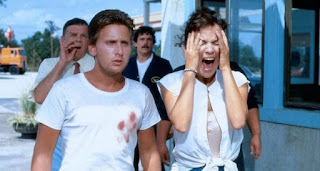Donald E.
Westlake might be best known as the author and creator of the
hard-boiled Parker character that features in several literary and
cinemaitc fictional outings. But a few years ago, a smaller publisher
called Hard Case Crime published one of the author's missing, or .
“never before published” works, entitled “Memory”.
Written
in the 1950s, the plot concerns an up-and-coming stage actor who
suddenly loses his functions for all faculties and facilitation of
proper memory because of an attack by an angry husband, whose wife
the actor had been having an affair with. The betrayed husband hits
the actor over the head with a wooden chair, and the novel opens up
in the hospital as the actor is awakening from this attack, only to
find that he has lost every facet of his previously-working memory.
He's lost his short-term memory, his long-term memory, and his
ability to retain any memory past the near-present, unless he
develops a fairly strict pattern of absolute repetition in his
existence. This pattern has to be constantly supported with
self-written notes and reminders through the underneath of the new
daily routine. Donald Westlake then takes us on a
four-hundred-plus-page journey through his lead character's
existential nightmare; which for me, raised some skin-prickling
philosophical questions, as well as a very big brain-nagging culture
question...
The
cultural question might not be what one might consider to be expected
– in that my own question is actually relegated to something else
that has popped up regarding Westlake's themes of memory loss, and to
a great contribution to pop culture at that – through Christopher
Nolan's breakout film, Memento.
My
question on this, where in Nolan's film his lead character suffers
with the very same existential nightmare as that of Westlake's
creation, is sort of a two-parter: Did Nolan somehow have the
opportunity the claimed “never before published” manuscript, and
was then able in incorporate many of these philosophical ideas of
memory and existence into his own screenplay for Memento
– or – are
these questions just existentially inherent in any of us (like
Christopher Nolan and/or Donald Westlake) for us to delve into if the
notion ever occurs to us to ask?
My
second question as to the mystery of Westlake's book, then, concerns
the philosophy itself: Does existence actually really matter if we
have no memory to use to incorporate, and in a sense, categorize (and
even internalize), our own existence? With huge credit given toward
Donald Westlake, he actually attempts to (and depending on your
personal opinions, he does) answer these nearly mind-boggling
questions. These are questions that stretch our imaginations, to be
sure, as well as our own anxieties and nightmares about what it is to
be a human being. The nearly heart-wrenching (yet surprisingly subtle
and deeply meaningful) ending to Westlake's novel Memory
might
give most people answers to these philosophical questions, whether
they wanted them or not – because the conclusion depends on if
living in the present is exciting or horrifying, in your personal
perspectives, which is what makes the entire novel, from page one,
utterly riveting.
(The film, Memento...)





























